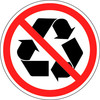But let’s return to their greater misunderstanding: that there’s some shortage of metals out there. It’s true that there is a limitation, of course it is. There is a number of nickel and or cobalt atoms on the planet and that’s a hard limit to the number we can use. But what we want to know is how close we are to it.
As I point out in that linked (and free!) book: we’re nowhere near any limit that need bother us. We’ve some 800,000 years of nickel left (assuming no recycling) and 34 million of cobalt – enough to be getting along with, given the average lifespan of a species is three million years.
So why the worrying that we are? Mainly, it’s because people misunderstand the technical jargon used in the industry. They talk about mineral reserves and mineral resources without realising that these are not a fair indication of useable resource. No, not even a guide, not an estimation, there simply is no link at all.
A mineral reserve is something that we have drilled, tested, dug up a bit and processed, and we have now proven that we can extract this at current prices, using current technology, and make a profit doing so. This is an economic definition: roughly speaking, the stock at already existing mines.
A mineral resource is where we’re pretty sure all of that is true – we’ve just not proved it yet. And then there’s the stuff we’ve not got around to looking at – which is true of the bulk of the planet and the bulk of all minerals.
It costs millions, sometimes hundreds of millions, to prove a resource into a reserve. It also costs millions to tens of millions to qualify a resource in the first place. So we don’t do this for things which we’re likely to use 30 years hence. Why spend all that money now to then wait for decades?
That’s why, if you go and look at mineral reserves, you’ll find we’re going to run out of everything in 30 – 50 years. And that’s because the best definition of a reserve is what we’ve prepared for us all to use in the next 30 – 50 years. To complain about this is like complaining that the food in the fridge is about to run out – without referring to the supermarkets and food production system which exists to fill up our fridges again.
It’s this mistake which leads to the insistence that we must recycle everything for we’re going to run out. We’re not. That underlying contention is simply wrong.
Just look at that famed Club of Rome report, Limits to Growth. They, entirely correctly, note that mineral reserves are going to last 30 – 50 years. They then, again entirely correctly, note that mineral resources can and will be converted into reserves by the application of time and money. But they then simply assume that resources out there are only 10 times current reserves. Hmm, 10 x 30 – 50 years is 300 to 500, isn’t it? So it’s not all that much of a surprise that they tell us that society is doomed, doomed, in only a couple of centuries when they add a bit of exponential growth in usage. Their prediction comes from their assumption, that wholly incorrect one, that current reserves are an indication of the total amount available to us.
All too many predictions of this sort are based on entirely and totally wrong assumptions. The truth is we simply do not have a shortage of any mineral, over any human timescale, that we might want to use. Any policy based upon the assumption that we do is provably wrong. So we’d better revisit those policies based upon this incorrect assumption pretty sharpish, shouldn’t we?





